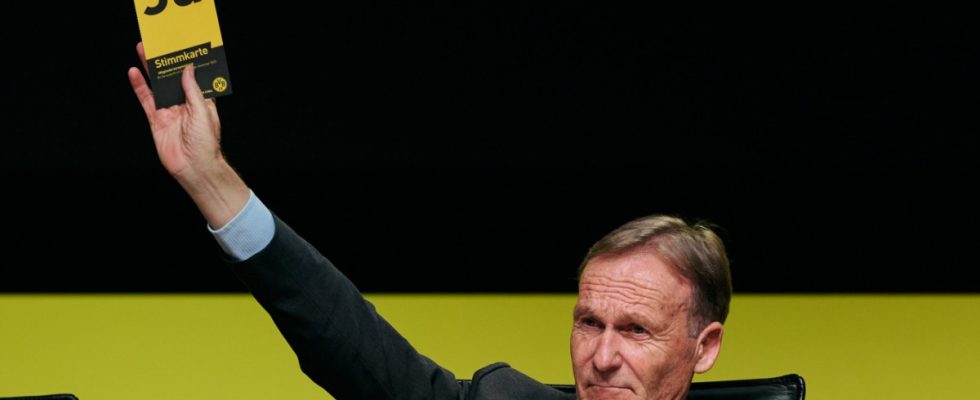After six first division and ten second division clubs refused to approve the plan drawn up by the German Football League (DFL) to involve an investor on May 24th, thereby destroying the deal, quite a few industry reporters predicted the end of German unity. Not the collapse of the nation as such, but the secession between the first and second Bundesliga.
The reason for this was, among other things, the comments of influential officials who were committed to the business. At the press conference after the general meeting of the two leagues, Eintracht Frankfurt’s CEO Hellmann called the vote “a defeat for central marketing” – the economic community of the 36 professional clubs. Borussia Dortmund’s managing director Hans-Joachim Watzke whispered that now “the bigger clubs have to think about what happens next.” “No one should come to him anymore” with the topic of solidarity.
In the media, the reactions and other unofficial statements were interpreted as indications of a divorce. Among other things, it was said that the first and second leagues would go their separate ways in the future, that the big clubs would no longer share their TV fees with the smaller clubs and that BVB and FC Bayern could move to the Super League.
Although such sounds are no longer spoken of, their echo has not faded away and, to a certain extent, forms the atmospheric background when the 36 clubs gather for the next family meeting on December 11th to once again discuss the involvement of a donor to strengthen the common business basis advise. This time there is no longer talk of an investor, but of a “strategic partner” for the DFL, and the target is no longer a haul of two billion euros as in the early summer, but only half.
Nevertheless, some club representatives, especially from the second division, might think that this time too it is about the big picture and its preservation. The threatening potential of the “divisive narrative” has an intimidating effect, says the official of a first division club, who is critical not only of the political tricks, but also of the financial construct as such. He’s not the only one. Once again, German professional football is faced with a kind of question of faith.
At least one important point of contention is no longer on the list: Unlike the variant presented in early summer, no pro-rata amount will be paid out to the clubs under the new, reduced marketing model. There is therefore no dispute about who gets how many millions.
The leadership of SC Freiburg has already spoken out against the model
However, it is unclear whether the two-thirds majority required for a positive resolution will be achieved. At FC Bayern, it is said, they are still weighing up the pros and cons, among other things because questions of marketing autonomy are affected. There is sentiment in fan circles against the project for ideological reasons; the members of the second division club Fortuna Düsseldorf recently instructed the club’s board of directors to vote against the deal. The management of SC Freiburg has already spoken out against the model that BVB and leading DFL official Watzke is promoting: The sports club also believes it is necessary to strengthen the competitiveness of the leagues and to invest in digitalization, foreign marketing and other fundamental aspects To invest in tasks, but for the capital requirements estimated by the DFL, you don’t need a partner from the private equity industry, say the Freiburg residents. This amount could be raised through contributions from the clubs themselves.
Other clubs that have less equity than the SCF (most recently in the black with 111.1 million euros) may see it differently. Domestic financing would mean sacrifices in everyday life and is therefore unpopular. The DFL, which explained its plans in two large rounds of discussions in November, is making a calculation for the solution with a private equity firm in which everyone wins: for a maximum eight percent share in sales in a joint marketing company over a period of twenty years – The main content would be the media rights – the donor would put down around one billion euros. The amount would be paid in installments, the DFL would receive 600 to 700 million for investments, 300 million would be passed on to the clubs to compensate for the shortfall in revenue in the first six years.
After this period, according to the business plan, additional revenue should arise, which will then equalize the partner’s share of the revenue. The DFL believes high growth is possible in foreign business. Revenue is currently around 200 million euros annually, and the DFL believes it is possible to increase it to more than 400 million through its own streaming platform, among other things. Measures to protect the exclusivity of television partners are also planned – “Piracy in pay-TV is a main obstacle to growth,” says the DFL.
Clubs report that, unlike the first attempt, the process is explained much more transparently. In addition, the DFL has guaranteed that the business partner does not receive any design or veto rights in sports operations. What is controversial, however, is the short period of time until the decision is made. According to the supporters’ timetable, on December 11th the order will not only be given to DFL managing directors Marc Lenz and Steffen Merkel to negotiate the deal with the five private equity firms invited to the offer. The DFL Presidium should also receive a final mandate.
Time is running out because of the tender for the next period of media rights next spring, so the deal with the investor should be completed by February. “We are also sending signals of strength to the market,” say advocates of external financing. There is also hope for a better deal in the TV business – if the leagues come to a consensus. Otherwise it could get really uncomfortable.

